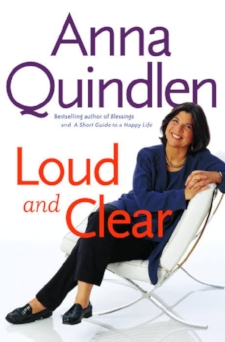Book Review by Raymond M. Wong
Quindlen, Anna. Loud and Clear. New York: Random House, 2004. Print.
Anna Quindlen isn’t afraid to speak her mind and she does it through prose that is insightful, precise, political, and heartfelt. Loud and Clear, a collection of Quindlen’s columns from Newsweek and The New York Times, provides personal reflections from a Pulitzer-winning writer, one who has worked as a reporter, columnist, and novelist.
Quindlen tackles societal issues such as childhood hunger in the U.S. by outlining the problem and revealing our nation’s priorities: “For a significant number of Americans, the cost of an additional meal for two school-age children for the eight weeks of summer vacation seems like a small fortune. Some don’t want or seek government help because of new welfare policies. Others don’t know they’re eligible, and none could be blamed if they despaired of the exercise. The average length of a food stamp application is twelve often impenetrable pages; a permit to sell weapons is just two” (54).
There is more than a hint of indignation in Quindlen’s tone, but she’s not merely posting a complaint. She exposes the problem by bring us closer to the reality of hunger: “[…] I found myself in a bodega with a distraught woman after New York City had declared a snow day; she had three kids who ate breakfast and lunch at school, her food stamps had been held up because of some bureaucratic snafu, and she was considering whether to pilfer food from the senior center where she worked as an aide” (55). Then Quindlen calls us to do something about it in the name of humanity: “Surely there should be ways for a civilized society to see that such a thing would never happen, from providing a simpler application for food stamps to setting a decent minimum wage” (55).
Quindlen also shows the ability to use data to back her assertion that America’s lax gun laws contribute to increasing violence and loss of life: “We register cars in this country, but not guns. And as a result, the United States has the highest rate of gun violence among the world’s most prosperous nations. In 1997, an astonishing 86 percent of gun deaths of children under fifteen in the world took place here” (78).
Quindlen’s columns go to the heart of social justice in addressing the plight of African Americans in our country: “It is an astonishing dissonance in a nation allegedly based on equality, that there is a group of our citizens who are assumed, simply by virtue of appearance, to be less. Less trustworthy. Less educated or educable. Less moral” (88).
And Quindlen opens a window to the power of the most important influence in anyone’s life and the depth of loss when that person passes: “There’s just a hole in my heart, and nothing to plug it. The truth is that there’s no one, ever, in your life like your mother. And that’s even if she’s a bad mother, punitive, critical. Your mother is the mirror. Whether you elect to gaze at the reflection with equanimity, to tilt the glass or crack it outright, it is the point from which you always begin. It is who you are” (227).
Quindlen celebrates the acceptance and recognition accorded gay couples as a sign of growing tolerance in our society. She bemoans the lack of free and unstructured time for children in the U.S. as an indication of the manic pace adults have become enslaved to. She introduces us to a young woman named Andrea Haberman who lost her life in the north tower on September 11, 2001, a day that changed the fabric of this country.
Anna Quindlen’s words resonate long after you’ve read her work because she writes from the core of her being, a place of truth, and because she’s willing to go there, she touches us and makes us aware of our foibles, our courage, and our humanity.
